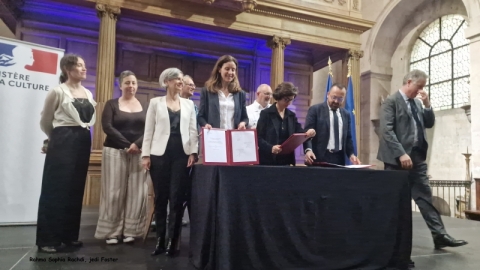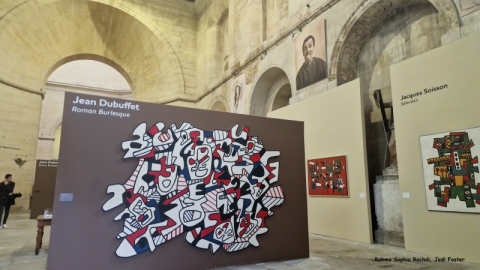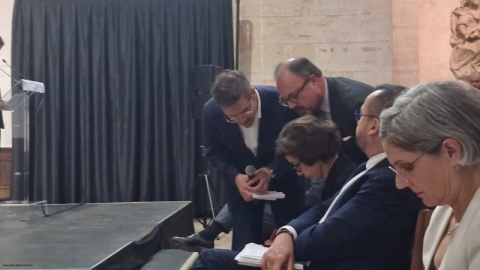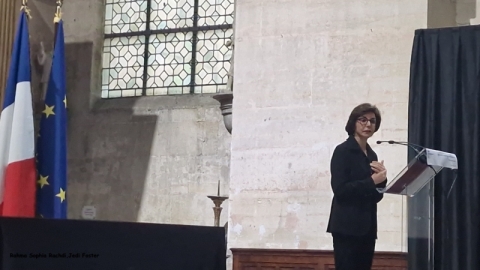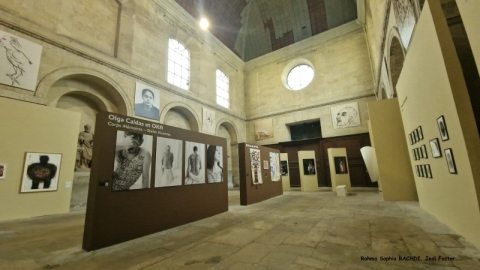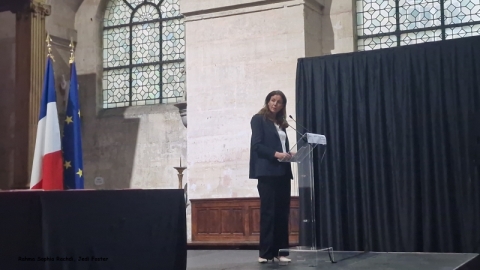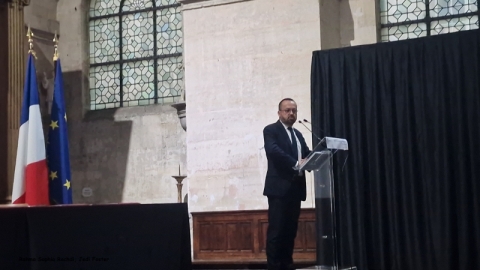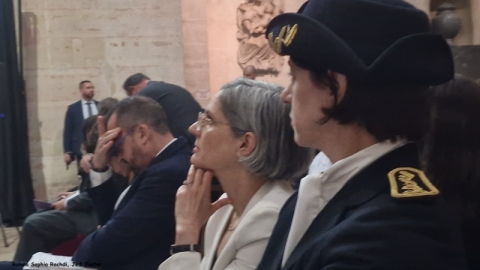Politics
MIN OF CULTURE & HEALTH & DISABILITY SIGNING AGREEMENT WITH APHP HOSPITALS
RACHIDA DATI AT “VULNERABLES” EXHIBITION

Rachida DATI, French Minister of Culture (Source: Rahma Sophia Rachdi, Jedi Foster)
USPA NEWS -
On Monday, July 21, 2025, at 10:30 a.m., Rachida Dati, Minister of Culture, Yannick Neuder, Minister for Health and Access to Care, and Charlotte Parmentier-Lecocq, Minister Delegate for Autonomy and Disability, visited the Pitie-Salpetrière Hospital in the 13th arrondissement of Paris (the largest French & Historical Hospital) to sign the new interministerial agreement on Culture and Health.
Before the official speeches began, the ceremony opened with a moving visit to the Vulnérables exhibition by Professor David Cohen both a surgeon and an artist, held in the historic Saint-Louis Chapel of the Salpetrière Hospital. The exhibition establishes a dialogue between the architectural heritage of the chapel and contemporary works, including Art Brut, exploring different forms of vulnerability mental, physical, and social through diverse media such as painting, photography, video, sculpture, and interactive installations.
Next, a patient named Muriel, living with a mental health condition that affects her speech, read one of her own poems aloud. Through her poetic practice, she has regained confidence and found empowerment in self-expression.
Before the official speeches began, the ceremony opened with a moving visit to the Vulnérables exhibition by Professor David Cohen both a surgeon and an artist, held in the historic Saint-Louis Chapel of the Salpetrière Hospital. The exhibition establishes a dialogue between the architectural heritage of the chapel and contemporary works, including Art Brut, exploring different forms of vulnerability mental, physical, and social through diverse media such as painting, photography, video, sculpture, and interactive installations.
Next, a patient named Muriel, living with a mental health condition that affects her speech, read one of her own poems aloud. Through her poetic practice, she has regained confidence and found empowerment in self-expression.
OFFICIAL CEREMONY OF SIGNING OF THE INTERMINISTERIAL “CULTURE & HEALTH” AGREEMENT
Monday, July 21, 2025 – 10:30 AM
On Monday, July 21, 2025, at 10:30 a.m., Rachida Dati, Minister of Culture, Yannick Neuder, Minister for Health and Access to Care, and Charlotte Parmentier-Lecocq, Minister Delegate for Autonomy and Disability, visited the Pitie-Salpetrière Hospital in the 13th arrondissement of Paris (the largest French & Historical Hospital) to sign the new interministerial agreement on Culture and Health.
Before the official speeches began, the ceremony opened with a moving visit to the Vulnérables exhibition by Professor David Cohen both a surgeon and an artist, held in the historic Saint-Louis Chapel of the Salpetrière Hospital.
Monday, July 21, 2025 – 10:30 AM
On Monday, July 21, 2025, at 10:30 a.m., Rachida Dati, Minister of Culture, Yannick Neuder, Minister for Health and Access to Care, and Charlotte Parmentier-Lecocq, Minister Delegate for Autonomy and Disability, visited the Pitie-Salpetrière Hospital in the 13th arrondissement of Paris (the largest French & Historical Hospital) to sign the new interministerial agreement on Culture and Health.
Before the official speeches began, the ceremony opened with a moving visit to the Vulnérables exhibition by Professor David Cohen both a surgeon and an artist, held in the historic Saint-Louis Chapel of the Salpetrière Hospital.
. The exhibition establishes a dialogue between the architectural heritage of the chapel and contemporary works, including Art Brut, exploring different forms of vulnerability mental, physical, and social through diverse media such as painting, photography, video, sculpture, and interactive installations.
Next, a patient named Muriel, living with a mental health condition that affects her speech, read one of her own poems aloud. Through her poetic practice, she has regained confidence and found empowerment in self-expression.
The speeches then followed, beginning with the Director of the Pitie-Salpêtriere Hospital, host of the venue, and continuing with addresses by the three ministers. The ceremony concluded with Minister Rachida Dati inviting her colleagues onto the stage to jointly sign the new Culture and Health agreement, followed by an official group photo.
Next, a patient named Muriel, living with a mental health condition that affects her speech, read one of her own poems aloud. Through her poetic practice, she has regained confidence and found empowerment in self-expression.
The speeches then followed, beginning with the Director of the Pitie-Salpêtriere Hospital, host of the venue, and continuing with addresses by the three ministers. The ceremony concluded with Minister Rachida Dati inviting her colleagues onto the stage to jointly sign the new Culture and Health agreement, followed by an official group photo.
MINISTER OF CULTURE RACHIDA DATI SIGNED THE AGREEMENT CIULTURE& HEALTH, RENEWING THE 1999 1st ONE
Minister Dati then quickly returned to the Ministry of Culture, where she signed a partnership agreement with Brad Smith, CEO of Microsoft, at 12:30 p.m.
During the launch of the “VulnErables” exhibition, organized by Professor David Cohen in La Chapelle Saint Louis at Hôpital de la Pitie Salpêtriere (AP HP) on 24 June 2025, a new inter-ministerial convention was signed between: Ministry of Culture Rachida Dati, Ministry of Health Yannick Neudet, Ministry delegate for Disability, Charlotte Parmentier-Lecoq and AP HP (Assistance Publique/ Hôpitaux de Paris)
This partnership marks a strategic renewal of cultural-health cooperation—its first in over 15 years, with the goal of integrating cultural activity into hospital settings and improving care for vulnerable patients. The “Vulnerables” exhibition explores themes of mental, physical, and social vulnerability through a blend of contemporary art, art brut, and psychiatric history, creating an immersive dialogue in a historic healing It leverages art as a transformative tool for empathy, resilience, and inclusive healthcare settings.
Minister Dati then quickly returned to the Ministry of Culture, where she signed a partnership agreement with Brad Smith, CEO of Microsoft, at 12:30 p.m.
During the launch of the “VulnErables” exhibition, organized by Professor David Cohen in La Chapelle Saint Louis at Hôpital de la Pitie Salpêtriere (AP HP) on 24 June 2025, a new inter-ministerial convention was signed between: Ministry of Culture Rachida Dati, Ministry of Health Yannick Neudet, Ministry delegate for Disability, Charlotte Parmentier-Lecoq and AP HP (Assistance Publique/ Hôpitaux de Paris)
This partnership marks a strategic renewal of cultural-health cooperation—its first in over 15 years, with the goal of integrating cultural activity into hospital settings and improving care for vulnerable patients. The “Vulnerables” exhibition explores themes of mental, physical, and social vulnerability through a blend of contemporary art, art brut, and psychiatric history, creating an immersive dialogue in a historic healing It leverages art as a transformative tool for empathy, resilience, and inclusive healthcare settings.
A PROMISING CULTURAL HEALTH SYNERGY
This agreement signals a renewed commitment to Improving patient experience through art in medical environments, but also supporting disabled persons via inclusive cultural access programs and strengthening collaboration across ministries and central institutions.
It’s a powerful example of how culture, health, and disability sectors can converge to enrich hospital life and foster dignity, empathy, and healing for vulnerable communities.
In France, more than 20 million people live with chronic illnesses or disabilities, profoundly affecting their daily lives and well-being. Despite medical advances, many still face barriers to full social participation, including access to culture and the arts, which are essential for mental and physical health. This national 2025, Mental health campaign aims to highlight the importance of integrating cultural access into healthcare and social inclusion, making culture a true fundamental right for all.
This agreement signals a renewed commitment to Improving patient experience through art in medical environments, but also supporting disabled persons via inclusive cultural access programs and strengthening collaboration across ministries and central institutions.
It’s a powerful example of how culture, health, and disability sectors can converge to enrich hospital life and foster dignity, empathy, and healing for vulnerable communities.
In France, more than 20 million people live with chronic illnesses or disabilities, profoundly affecting their daily lives and well-being. Despite medical advances, many still face barriers to full social participation, including access to culture and the arts, which are essential for mental and physical health. This national 2025, Mental health campaign aims to highlight the importance of integrating cultural access into healthcare and social inclusion, making culture a true fundamental right for all.
As part of France’s national commitment to mental health, the year 2025 has been officially declared the Grande Cause Nationale dedicated to Mental Health and Psychological Wellbeing, with the full support of President Emmanuel Macron. This major cause seeks to elevate mental health to a top national priority and to dismantle stigma and silence surrounding psychiatric illness, disability, and neurodiversity.
On this occasion, a powerful symbolic event took place at the Pitié-Salpêtrière Hospital in Paris a hospital with a deep-rooted historical link to psychiatric care and a place of memory, humanity, and care. Here, a key cultural and political gathering was held inside the Chapelle Saint-Louis, during the visit of the exhibition Les Vulnérables curated by David Cohen, a pioneering figure in child psychiatry.
On this occasion, a powerful symbolic event took place at the Pitié-Salpêtrière Hospital in Paris a hospital with a deep-rooted historical link to psychiatric care and a place of memory, humanity, and care. Here, a key cultural and political gathering was held inside the Chapelle Saint-Louis, during the visit of the exhibition Les Vulnérables curated by David Cohen, a pioneering figure in child psychiatry.
It was within this historic chapel, both a place of worship and a vibrant cultural venue, that a tripartite agreement was signed between the Ministry of Culture, the Ministry of Health, and the Ministry for People with Disabilities, in partnership with AP-HP (Assistance Publique Hôpitaux de Paris).
As emphasized by Nicolas Revel, Director General of AP-HP: “This Chapelle Saint-Louis is part of our heritage, a listed historical monument. It is a place of spiritual reflection but also of worship and culture. In 2024, 30,000 people attended conferences, concerts, and exhibitions here, and we are proud to host this summer the exhibition led by David Cohen in child psychiatry, featuring works by about twenty ‘vulnerable’ artists. The number of visitors is impressive, most of them caregivers and patients, dedicated to both spirituality and culture. For 25 years, we’ve been working to bring art and culture into the hospital.
As emphasized by Nicolas Revel, Director General of AP-HP: “This Chapelle Saint-Louis is part of our heritage, a listed historical monument. It is a place of spiritual reflection but also of worship and culture. In 2024, 30,000 people attended conferences, concerts, and exhibitions here, and we are proud to host this summer the exhibition led by David Cohen in child psychiatry, featuring works by about twenty ‘vulnerable’ artists. The number of visitors is impressive, most of them caregivers and patients, dedicated to both spirituality and culture. For 25 years, we’ve been working to bring art and culture into the hospital.
Today’s signing ceremony is a continuation of this partnership. AP-HP works with about twenty institutions such as the Louvre, the Quai Branly Museum, the École du Louvre, Théâtre de la Ville, Festival d’Automne, Musée Guimet, and Musée Picasso, among others — across 28 hospital establishments
This is not just a pastime or a search for escapism, but something essential, supporting patients throughout the healthcare routine, whose bodies and minds are put through immense trials due to their conditions. Art therapy, often seen as a heavy burden, has become an integral part of recovery projects, especially in respiratory care and child psychiatry. Its benefits are clear, particularly in boosting the self-confidence of young patients. It touches on the intimate, the hopeful, the joyful, and the vital and therefore, on humanity itself. Thank you to the Ministers for signing this agreement in a heritage site that is also a place of creation and projection. We hope to create a national space where culture and health intersect. And thank you to all the volunteers and caregivers for making the hospital not just a place of treatment, but one of meaning and dignity.” Declared Nicolas Revel, General Director of hospital Salpetriere
REMARKS BY CHARLOTTE PARMENTIER-LECOCQ, MINISTER DELEGATE FOR PEOPLE WITH DISABILITIES
“I am very pleased to be with you today and to acknowledge the work of the AP-HP in promoting access to culture within healthcare, as a way to recover health and find meaning during painful trials within the care process.
The purpose of today’s agreement is clear: we are here in full force to ensure that culture becomes an integral part of all aspects of care and the medico-social sphere.
For persons with disabilities and elderly people, this agreement represents a significant step toward integrating culture into the medico-social field. These populations are the first to hope and expect this access, bringing culture into their journey is like opening a window to the outside world from within a cold and clinical environment. It’s a way to combat isolation and to restore life’s path.
I would like to take this opportunity to thank the ARS (Regional Health Agencies), the DRAC (Regional Cultural Affairs Directorates), healthcare professionals, and local elected officials.
“I am very pleased to be with you today and to acknowledge the work of the AP-HP in promoting access to culture within healthcare, as a way to recover health and find meaning during painful trials within the care process.
The purpose of today’s agreement is clear: we are here in full force to ensure that culture becomes an integral part of all aspects of care and the medico-social sphere.
For persons with disabilities and elderly people, this agreement represents a significant step toward integrating culture into the medico-social field. These populations are the first to hope and expect this access, bringing culture into their journey is like opening a window to the outside world from within a cold and clinical environment. It’s a way to combat isolation and to restore life’s path.
I would like to take this opportunity to thank the ARS (Regional Health Agencies), the DRAC (Regional Cultural Affairs Directorates), healthcare professionals, and local elected officials.
Over 1,000 projects have already emerged since the previous agreement, which shows the real value of this initiative. Together with the Minister of Culture, we believe that access to culture is not just a remedy or a side activity, as echoed in our joint efforts with Yannick Neuder during the July 9th summit.
This is a crucial topic. We have made mental health a national priority for 2025, along with inclusion. And tomorrow, I will co-chair a session with the Minister of Culture to further this momentum.” Stated Charlotte Parmentier-Lecocq,
This is a crucial topic. We have made mental health a national priority for 2025, along with inclusion. And tomorrow, I will co-chair a session with the Minister of Culture to further this momentum.” Stated Charlotte Parmentier-Lecocq,
REMARKS BY YANNICK NEUDER, MINISTER DELEGATE FOR HEALTH & PREVENTION
"Patients often wonder, along their medical journey, about the meaning and necessity of cultural access. We are here today, in this chapel which houses relics of Christ., symbols that hold deep meaning for some patients. I was moved this morning, as it was my first visit here. Medico-legal activities allow caregivers to integrate culture with care, reinforcing the healing process.
The exhibition by Dr. David Cohen, and the publication of the book by the pneumologist on smoking, both contribute to improving patient well-being.
As André Malraux once said, 'In culture for all, there are cultures for each.' A school, a high school, a hospital, or a nursing home can all be cultural spaces.
As Minister of Culture Rachida Dati said during her press greetings, the medico-social sector must embrace inclusion, particularly for people with disabilities. We all have a shared interest in being united around her vision.
"Patients often wonder, along their medical journey, about the meaning and necessity of cultural access. We are here today, in this chapel which houses relics of Christ., symbols that hold deep meaning for some patients. I was moved this morning, as it was my first visit here. Medico-legal activities allow caregivers to integrate culture with care, reinforcing the healing process.
The exhibition by Dr. David Cohen, and the publication of the book by the pneumologist on smoking, both contribute to improving patient well-being.
As André Malraux once said, 'In culture for all, there are cultures for each.' A school, a high school, a hospital, or a nursing home can all be cultural spaces.
As Minister of Culture Rachida Dati said during her press greetings, the medico-social sector must embrace inclusion, particularly for people with disabilities. We all have a shared interest in being united around her vision.
This agreement, originally signed in 1999 by Catherine Trautmann and Bernard Kouchner, affirms that culture is a powerful communication tool and a support mechanism in the patient’s care journey, according to their needs and emotional state.
If there is one medical specialty that lends itself to alleviating anxiety and offering hope, it is indeed art in the realm of mental health.
The simulation presented by artificial intelligence today showed how observing the patient’s breathing rhythm can help restore a fundamental sense of self. Thank you all."
If there is one medical specialty that lends itself to alleviating anxiety and offering hope, it is indeed art in the realm of mental health.
The simulation presented by artificial intelligence today showed how observing the patient’s breathing rhythm can help restore a fundamental sense of self. Thank you all."
REMARKS BY RACHIDA DATI, MINISTER OF CULTURE
“We are often disconnected between what we say and what we truly experience.
First of all, I want to pay tribute to caregivers I was a nursing assistant for six years as well as to cleaning staff, because I have also worked as a cleaning lady. The two roles I am most proud of being nursing assistant and Minister of Justice, because in both cases, there is no veil, no masks you see people’s true faces.
Your commitment makes you the first link and the sensor of what is going well, better, or worse, so I sincerely thank the entire chain of life care: cleaning staff and nursing assistants, because I have been one myself, and also the doctors. Often, it is because you have opened a new dimension of being, that of life itself, necessarily because you have experienced something intense at some point in your life. Thanks to Rose, Amadou, Tristan for this touching visit to the exhibition The Vulnerable. We all feel concerned, and being here in this place I know Mr. Director General Nicolas, you said this is a place of communion, which is wonderful.
“We are often disconnected between what we say and what we truly experience.
First of all, I want to pay tribute to caregivers I was a nursing assistant for six years as well as to cleaning staff, because I have also worked as a cleaning lady. The two roles I am most proud of being nursing assistant and Minister of Justice, because in both cases, there is no veil, no masks you see people’s true faces.
Your commitment makes you the first link and the sensor of what is going well, better, or worse, so I sincerely thank the entire chain of life care: cleaning staff and nursing assistants, because I have been one myself, and also the doctors. Often, it is because you have opened a new dimension of being, that of life itself, necessarily because you have experienced something intense at some point in your life. Thanks to Rose, Amadou, Tristan for this touching visit to the exhibition The Vulnerable. We all feel concerned, and being here in this place I know Mr. Director General Nicolas, you said this is a place of communion, which is wonderful.
Congratulations to Father Muzo and his homilies for all patients and the medical staff. I remember open homilies in a fractured country marked by rejection of the other, and opening up voluntarily. It makes sense, and together today we came with strength to affirm that culture is a fundamental right with immense effects, as we have realized throughout history. A long time ago, hospitals were only about care, but caregivers are not artists, and artists are not caregivers, and this is often said, yet you prove the opposite today.
Arts and culture are good for the body and mind, playing a preventive role in life against smoking, for example, and the comic book you gave us. Every year, thanks to Dr. David Cohen and your moving exhibition, we see that sick people, or people with disabilities (PSH), these moments create events and help fight addictions. A few years ago, the Institute of Invalids was only about care, but today it welcomes many cultural actors, as well as soldiers and veterans in difficulty. This is innovation and curiosity. The MUCEM’s activities for young girls who did not want to live have allowed them to rejoin society. These workshops are giant steps.
Arts and culture are good for the body and mind, playing a preventive role in life against smoking, for example, and the comic book you gave us. Every year, thanks to Dr. David Cohen and your moving exhibition, we see that sick people, or people with disabilities (PSH), these moments create events and help fight addictions. A few years ago, the Institute of Invalids was only about care, but today it welcomes many cultural actors, as well as soldiers and veterans in difficulty. This is innovation and curiosity. The MUCEM’s activities for young girls who did not want to live have allowed them to rejoin society. These workshops are giant steps.
Each year, 5 million euros are mobilized by our ministry, including 1 million euros for accessibility in cultural activities, which I have asked to amplify for blind youth. But beyond physical accessibility, we often don’t think about access for people with disabilities (PSH).
The Culture and Health label, a dynamic project Mr. Renaud, we have known each other for a long time, but always in the public interest, and I thank you. Parliamentarians, various associations this is the result of each of your actions in your role and rank. Thank you for your artistic and scientific exhibition with caregivers, and a special tribute to Muriel Courregs for her poem, because you explained what you suffer from and fight to lift taboos, especially about mental health, which parents used to be ashamed to discuss, especially parents of sick children.
The Culture and Health label, a dynamic project Mr. Renaud, we have known each other for a long time, but always in the public interest, and I thank you. Parliamentarians, various associations this is the result of each of your actions in your role and rank. Thank you for your artistic and scientific exhibition with caregivers, and a special tribute to Muriel Courregs for her poem, because you explained what you suffer from and fight to lift taboos, especially about mental health, which parents used to be ashamed to discuss, especially parents of sick children.
I am delighted to sign this agreement that reflects a reality that has been going on for years. We sign this agreement, but the biggest work has been done by YOU for so long.
I confirm the operation Art on Prescription, where mental health is the priority for 2025, and strictly therapeutic art will be implemented. A Health, Disability, and Inclusion coordinator will be set up everywhere to ensure accessibility to culture for people with disabilities (PWD), with training under the Ministry of Culture’s supervision, with prevention goals for therapy and all medico-social sectors. This will give new meaning to life and sometimes save lives in mental health units. Thanks to Yannick and Charlotte for restoring meaning." concluded Rachida Dati the French Minsiter of culture
I confirm the operation Art on Prescription, where mental health is the priority for 2025, and strictly therapeutic art will be implemented. A Health, Disability, and Inclusion coordinator will be set up everywhere to ensure accessibility to culture for people with disabilities (PWD), with training under the Ministry of Culture’s supervision, with prevention goals for therapy and all medico-social sectors. This will give new meaning to life and sometimes save lives in mental health units. Thanks to Yannick and Charlotte for restoring meaning." concluded Rachida Dati the French Minsiter of culture
Liability for this article lies with the author, who also holds the copyright. Editorial content from USPA may be quoted on other websites as long as the quote comprises no more than 5% of the entire text, is marked as such and the source is named (via hyperlink).

